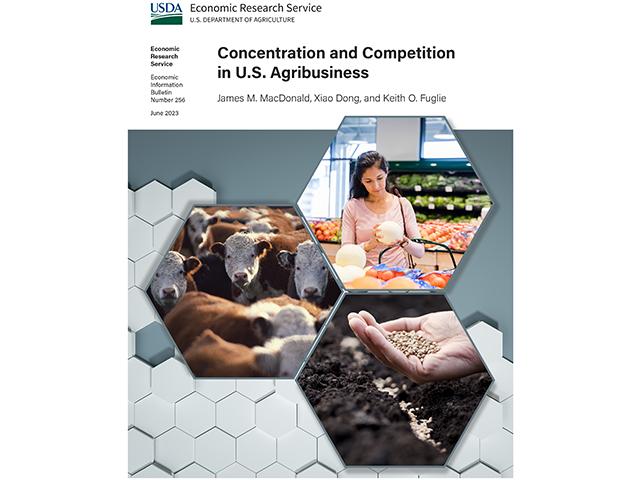We'd Like To Mention
A Concentrated Business
Concentration and consolidation are terms very familiar to the ag industry. In the U.S., a decline in the number of farms and an increase in farm size have been happening for decades. There were 200,000 fewer farms in 2022 than in 2007, according to the most recent USDA data. Services and suppliers to farmers and ranchers also continue to shrink, as companies and businesses merge and acquire mutual operations and competitors.
Concentration within agriculture and its impact on competition cultivates growing public scrutiny. Critics argue fewer companies operating in the same space weakens competition, leading to lower prices for products farmers sell but higher prices for the products they buy.
Like most issues, concentration in ag is complicated, with many factors behind it and the resulting outcomes filled with pros and cons, depending on one's point of view.
A new report from the USDA Economic Research Service takes an in-depth look at agricultural concentration in three sectors: seed, meatpacking and food retail. Generally, increasing concentration was driven by technological innovations, changes in market demand and redesigned supply chains. Mergers among competitors played a significant role in increasing concentration in the seed sector, a contributing role in food retail and a limited role in meatpacking. Here are a few key findings:
Seed. From 2018 to 2020, two seed companies accounted for 72% of planted corn acres and 66% of planted soybean acres across the U.S.
Opportunities to commercialize innovations in agricultural biotechnology and stronger protection for intellectual property rights over seed and related biotech innovations were major drivers of seed-sector consolidation. That spilled over into ag chemicals because of the stronger scientific and marketing links between pesticides and seeds.
Meatpacking. In 2019, the four largest meatpackers accounted for 85% of steer and heifer slaughter, and 67% of hog slaughter. The transformation of meatpacking industries saw shifts of production to larger plants to realize economies of scale and tighter vertical coordination among production and processing stages through reliance on contract arrangements in place of cash markets.
-- For more information, download the report at https://www.ers.usda.gov/…
IN OTHER NEWS:
WINNERS' CIRCLE
It's not hollow hyperbole when we say DTN/Progressive Farmer has the most talented content team in the industry, bringing you the best information to help your farming business grow and prosper. At the recent Ag Media Summit, the DTN/PF staff earned 37 awards, the most of any media group. The winning entries were part of the annual Agricultural Communications Network (ACN) Communication Awards program, where the work of communicators from across the country is judged in design, photography, writing, marketing and communications, as well as digital and social media.
P[L1] D[0x0] M[300x250] OOP[F] ADUNIT[] T[]
Here is the list of 1st place category winners and other notable recognitions:
Writing:
-- Breaking News: Katie Dehlinger
-- Human Interest: Des Keller
-- Team Story: Todd Neeley, Russ Quinn
-- Writer of Merit: Dan Miller, recognizing the highest level of excellence in ACN's Master Writer Program
Photography:
-- Photo of the Year: Joel Reichenberger
-- Honorable Mention Photo of the Year: Gregg Hillyer
-- Feature: Joel Reichenberger
-- Nuts & Bolts, Crops: Gregg Hillyer
-- Picture Story: Joel Reichenberger
-- Unpublished Photo: Joel Reichenberger
Design:
-- Overall Magazine Design: Brent Warren
-- Special Editorial Section: Brent Warren
-- Single-Page Editorial Design: Brent Warren, Barry Falkner
Digital & Social Media Publishing:
-- Multimedia Story: Dan Miller, Joel Reichenberger, Rob Lagerstrom
Digital & Social Media Marketing Communications:
-- Podcasts: Sarah Mock
**
-- Write Gregg Hillyer, 2204 Lakeshore Dr., Suite 415, Birmingham, AL 35209, email gregg.hillyer@dtn.com, or follow Gregg on X (formerly Twitter) @GreggHillyer
[PF_1023]
(c) Copyright 2023 DTN, LLC. All rights reserved.




